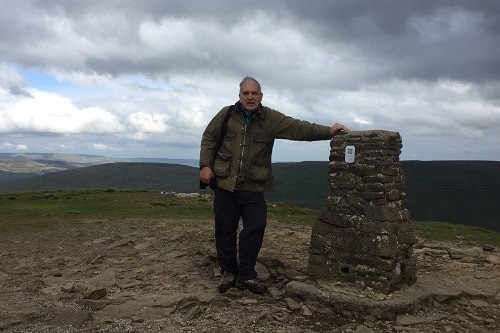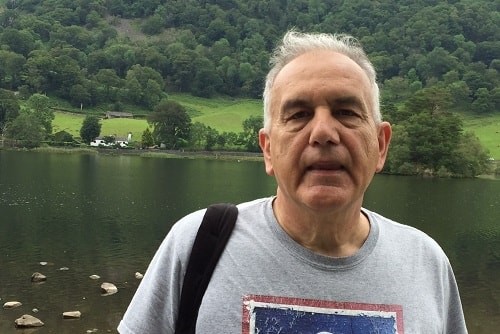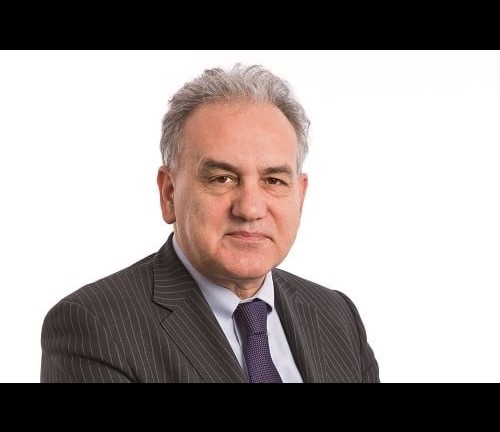Matthew Holder speaks to Neal Stone about the need for unity to resist a more dangerous world being thrust upon us. Neal is head of policy and governance at McOnie and served for many years as director of policy at the British Safety Council.
Features
Neal Stone: there is a case for unity
By a quirk of technology, my interview with Neal Stone did not start well. A video malfunction meant that Neal could only look at an empty, black screen whereas I was able to see him clearly in the light of locked-down Pendle in East Lancashire.
Though not ideal, as anyone who knows Neal will appreciate, he was perfectly able to speak freely and fluently across the geographical and digital divide on a subject that has dominated his life for nearly 30 years, without much prompting. A subject now charged by new relevance as the health and the economy of the country remains in the balance.
 Neal Stone: "Fragmentation has not served health and safety very well."
Neal Stone: "Fragmentation has not served health and safety very well."
The coronavirus pandemic has changed everything. It has made common well-rehearsed but niche health and safety mantras like good health is good business. It has exposed inequalities in our towns and cities, of the UK’s lack of preparedness to deal with a pandemic and, crucially, it has exposed the links between occupational and public health, between leadership and health outcomes: It is clear that in a pandemic, there is no public health without good occupational safety, health and wellbeing.
So, with all this change and his years of experience as an insider with important safety organisations, including HSE, I wanted Neal to tell us how he sees the current situation and where it might lead.
HSE: at the heart of it all
Though HSE might resist, it remains at the heart of the occupational health and safety system. For this reason, Neal is pleased that the DWP Select Committee on 4 March has now put the spotlight back on HSE. “After five years of disregard during Frank Field’s chairmanship of the Committee, under new chair Stephen Timms MP, HSE is now having to properly account for the decisions it takes and the priorities it is adopting. Parliamentary oversight is incredibly important.”
 Beautiful walks are one of the upsides to being locked down in Pendle in Lancashire
Beautiful walks are one of the upsides to being locked down in Pendle in Lancashire
Note the date. A lot has happened since 4 March and clearly the government is more interested in health and safety since Covid-19. Yet HSE already faced challenges before the pandemic struck. Prosecutions down, notices served down, local authority enforcement down. Nonetheless, the two chiefs – Martin Temple (since replaced by Sarah Newton) and Sarah Albon – presented to the Committee that, despite constrained resources, they are doing a good job.
“For me,” says Neal, “the enforcement record is a worrying one. I cannot see how anyone can justify HSE is performing as it should. Half the number of prosecutions since 2011. Long delays in getting to court, notices falling by the 1000’s. Many local authorities do not have the resources or expertise and their enforcement in the sectors they are responsible for is absolutely abysmal. To say the enforcement deficit is worrying is a massive understatement.”
Clearly, when you add in the remote chances of a workplace visit by an inspector, it is fair to say that HSE was already, before Covid-19, not in the same position of influence that it once had. Has the pandemic given HSE more punch? As previously reported by Safety Management, HSE faced further questions in May from the Committee and admitted it had received reports of more than 56 deaths to workers resulting from suspected Covid-19 but has taken no enforcement action and no action to shut down any workplaces. Plus ça change? Even with the extra £13 million to tackle Covid-19, Neal remains worried that with “a minority of fatal or major injuries at work resulting in any kind of action, enforcement will simply not act as the deterrent it should be”.
The wider sector: what chance unity?
Around HSE orbit a number of long-established organisations, some predating the existence of HSE. In a recent post on LinkedIn, Neal asked a simple question: with the Covid-19 crisis making a huge impact on the finances of our major health and safety charities, is now the time for coming together? The post was opened more than four thousand times and received a number of comments. It is undoubtedly a live issue. I asked Neal to explain why he wanted to ask the question and what he saw the consequences might be.
 Neal served for many years as director of policy at the British Safety Council
Neal served for many years as director of policy at the British Safety Council
His starting point is that the main UK health and safety charities, including IOSH, IIRSM, RoSPA and the British Safety Council are likely to be hit hard by the pandemic. Less available public money, businesses locking down unable to source services, the nature of spend on health and safety, will combine to reduce income and threaten reserves. “Lord McKenzie (ex-minister at DWP) pointed out years ago that the sector doesn’t speak with one voice. He said that we have been asking for a long time, why do we have so many charities in this field? It’s fragmented and there is too much overlap in the services, advice and support they provide.”
“My view is that this fragmentation had not served health and safety very well. It dilutes the message about its public benefit. Government doesn’t have a simple way of finding out what the sector thinks and so tends to ignore it.
"Historically there have been attempts to merge and consolidate but tribalism has tended to win out to prevent it. I understand it’s difficult, it’s hard to say to any one charity there is no reason for you to exist anymore. However, the financial hit might well drive these organisations to change, making it a necessity, whether we like it or not.”
There are pros and cons Neal explains: “Will it be good for business and improve their impact as charities? I’m not sure. By shrinking the number of training suppliers, businesses might have to pay more for these kinds of services. However, there is a case that with a consolidated voice genuinely promoting what is right and wrong, they may have more influence on government, business, the investor community and the public. Case unproved as yet.”
Leadership in the world of Covid-19
The importance of leadership on health and safety has long been an interest of Neal’s. From his HSE policy days, he was heavily involved in developing guidance, working closely with the business community and leading research into the metrics that leaders might use to demonstrate good health and safety. With HSE cutting this kind of innovative policy work many years ago, Neal thinks there has been a retreat.
“Look at the approach taken by the business community over Covid-19. Much of their public pronouncements have been about the financial impact, of losing jobs and debating whether businesses will get back to normal. How many business leaders have stood up and said our first consideration is about safety and health and this is how we will do it? Precious little.”
Neal admits that this might be as much a reflection of the media’s lack of interest in health and safety. Yet after many years of a series of uninterested governments, “health and safety is not high up the agenda. Yes Covid-19 has changed things but there is a real test of leadership coming up.
“Many employers, with furlough ending in October, will want to get staff back in the workplace. To do this successfully they will need to demonstrate good leadership on health and safety. They will need to convince people that their workplaces are safe, that social distancing measures are in place, that procedures are in place to deal with an outbreak quickly and effectively.
"Are leaders sufficiently believable and influential to make this happen to get people back to the workplace? I have my doubts. There has been a lack of leadership on this for years. Yes, there are investors interested in ESG (environmental and social governance) that you would think would mean better leadership from employers. In some cases, yes. For many, no. There is a big gap. We need more evidence of the value of strong leadership.”
Neal is not downhearted though. He has seen these currents and fashions come and go over the years, from leadership to wellbeing and ESG, to attach too much significance to them. The full impact of Covid-19 might take years to see.
“Workers saying we don’t have faith in the safety of workplaces – for example a lack of social distancing – means it could be a very difficult period by end October. However, there is the chance of a fundamental change in how work is done, how it is managed and how managers behave towards workers.
Will Covid-19 lead to step change in the health and wellbeing of workers? Let’s see. On being asked in 1972 about the significance of the French Revolution, Mao Zedong allegedly once said ‘it was too soon to tell’. It will be many years before the full impact of Covid-19 is properly understood, let alone applying the learning we need to take forward to tackle the inevitable next global pandemic.
FEATURES

Sedentary working and how to combat the ‘sitting disease’
By Gavin Bradley, Active Working on 05 April 2024
Prolonged and excessive sitting poses a major risk to our health, but the Get Britain Standing campaign and On Your Feet Britain Day on 25 April are a great way of encouraging workers to sit less and move more.

Company culture and wellbeing: a crucial link
By Bex Moorhouse, Invigorate Spaces on 05 April 2024
Investing in measures to support worker wellbeing will be ineffective unless the company culture genuinely incorporates values like teamwork, involvement, flexibility and innovation.

Office design and culture: happier and healthier staff – or the opposite?
By Guy Osmond, Osmond Ergonomics on 03 April 2024
Applying ergonomic principles to workstation set-ups and ensuring the physical environment supports neurodivergent people are just some of the ways of creating an office where everyone can thrive, but a supportive and positive organisational culture is vital too.


